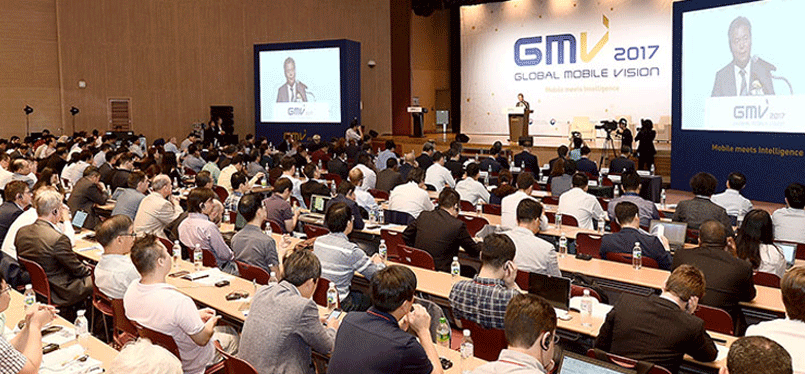

Compared to more traditional
industries, the mobile industry
has a rather short history, spanning
less than forty years. But
despite being a relatively newer sector, it’s
no doubt the most revolutionary. As such,
the South Korean government, along with
KOTRA, is doing their part to continue to
accelerate this revolution, especially as the
world is preparing to usher in the much
talked-about Industrial revolution.
Global Mobile Vision (GMV) 2017 is
just one of the ways that KOTRA is sparking
discussion on the latest technological
trends taking place in the mobile and ICT
industry. Held from September 13 to 15,
this year’s GMV took place at KINTEX in
the South Korean city of Goyang. Under
the theme ‘Mobile meets intelligence,’ the
event took a closer look at what the private
and public sectors are doing to respond to
the Fourth Industrial Revolution.
Now in its 10th year, GMV 2017 was
comprised of various programs, including
an exhibition, one-on-one meetings, MOU
signings and seminars for Korean companies
seeking to enter the overseas market.
A total of eight MOUs worth USD 2 million
were signed between Korean and foreign
companies specializing in IT, artificial
intelligence and virtual reality. Participants
also had a chance to learn more about
Korea’s latest 5G technological trends at
the GMV Conference, which invited
experts from some of the world’s leading
experts from some of the world’s leading
telecommunications companies, including KT Corporation, Qualcomm, Naver, Ericsson-LG and Sabre, among others.
According to experts at the conference, if
4G technology was about connecting people
faster, 5G goes well beyond that. “Only
5G technology can accelerate the Fourth
Industrial Revolution,” said Won Yeol Lee,
director of KT Corporation, South Korea’s
largest telephone company. “In 2018,
Korea will launch its 5G service at the
PyeongChang Winter Olympics, which is
the perfect opportunity to showcase
Korea’s innovative technologies to the
international community.”
But 5G won’t just change how we interact
with technology; it’s also going to
change the landscape of the entire world
economy. “In 2035, the global 5G value
chain will generate USD 3.5 trillion in
gross output and 22 million jobs—that’s
more than number of people living in Beijing,”
said an official at Qualcomm. “From 2020
to 2035, 5G will also boost real global
GDP growth by USD 3 trillion and more specifically,it will enable USD 2.4

trillion
in economic output across the broader
automotive sector.”
“The global demand for smart factories,
AI and IoT continues to increase by the
day,” said Kim Dooyoung, vice president
of KOTRA’s strategic business division.
Kim added that KOTRA will continue to
work closely with promising Korean ICT
companies and match them with overseas
business partners to further advance the
mobile industry.